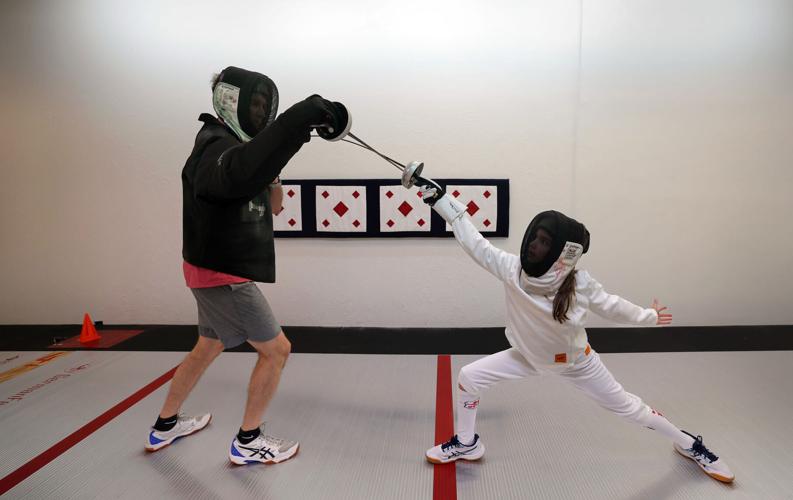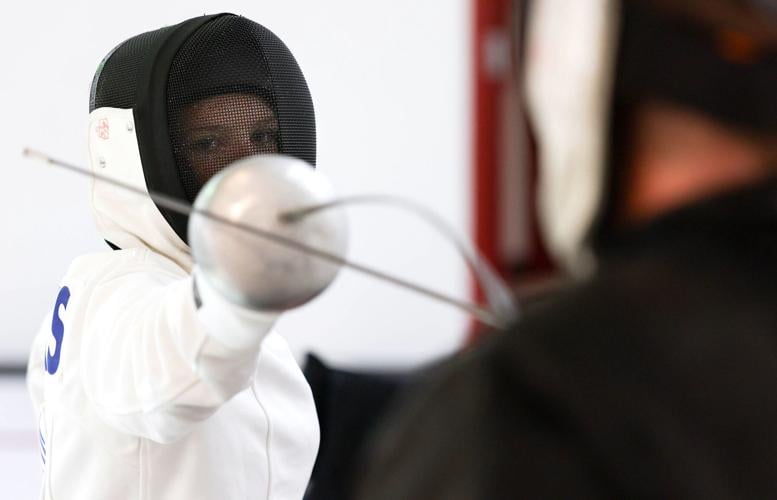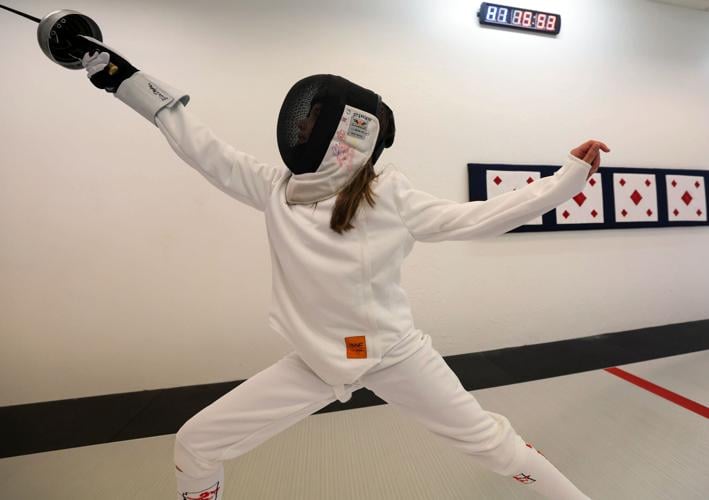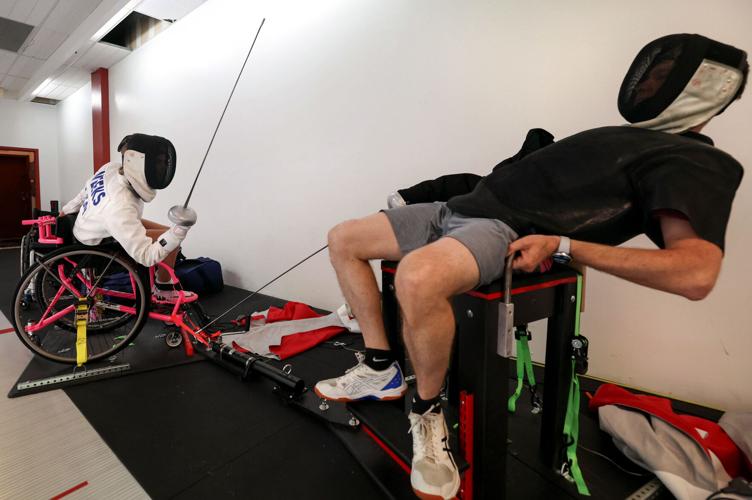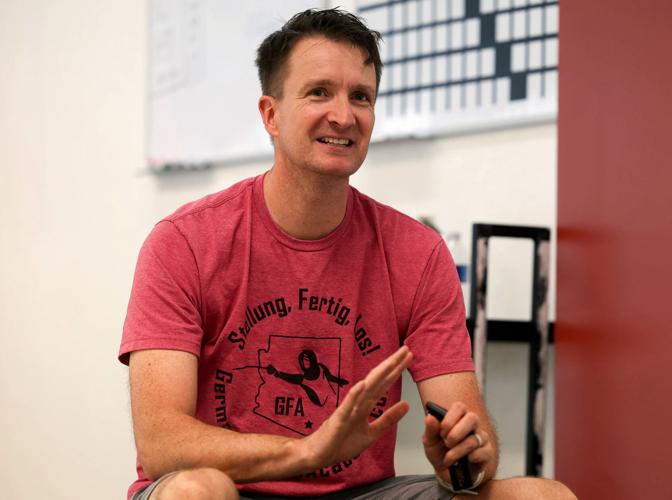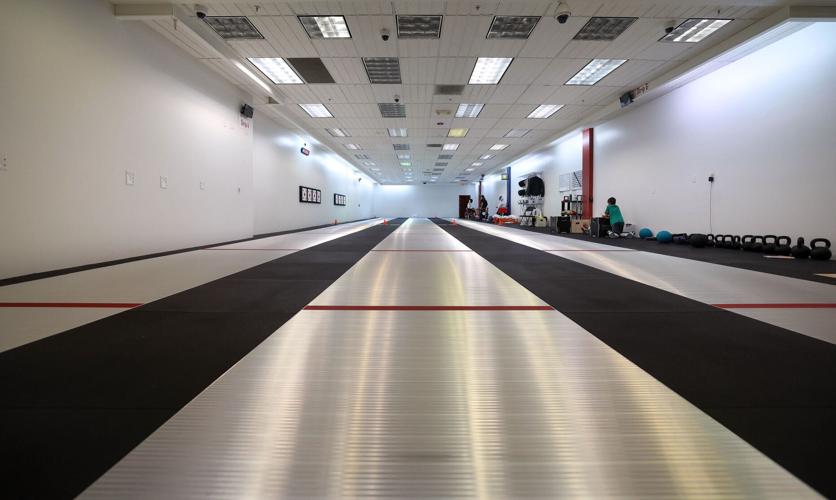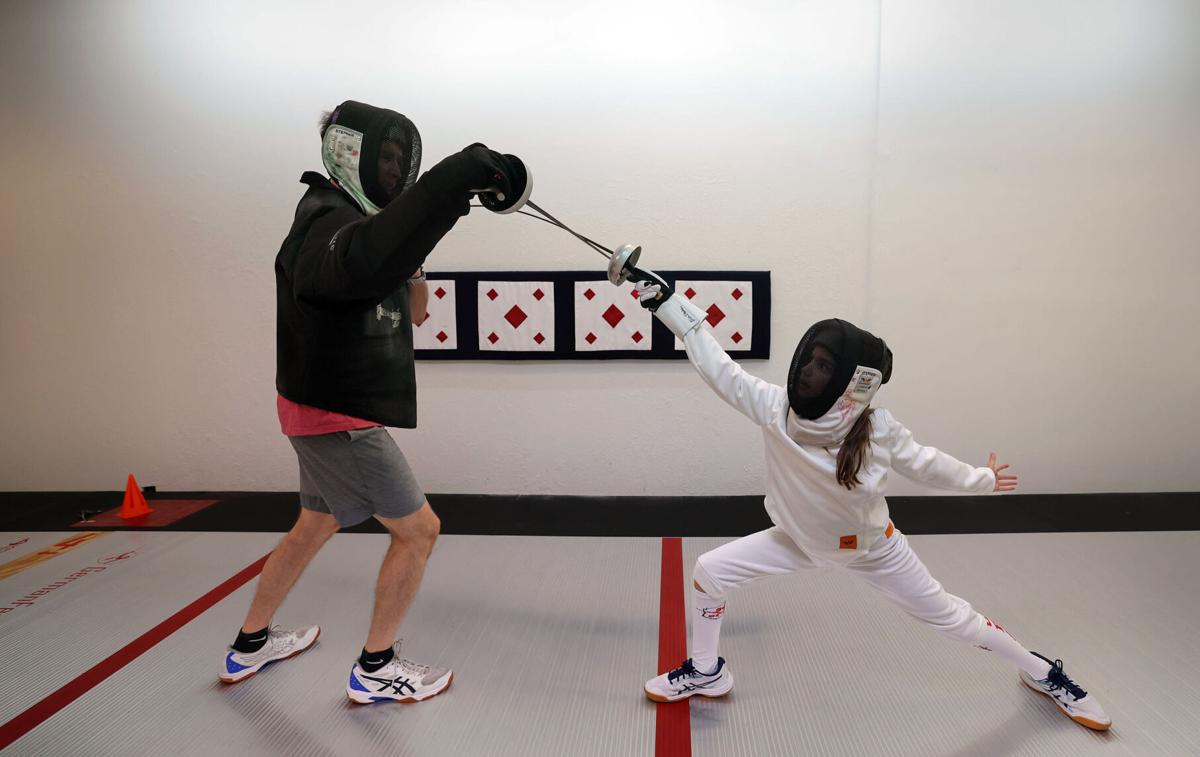Tucson Mall is home to many sounds — the shuffling of shopping bags, credit card readers beeping and ... the clanking of metal reminiscent of a medieval sword fight?
Yes, you read that correctly.
During the late afternoons on the bottom floor of Tucson Mall near the old Sears, you’ll find 46-year-old Jens Stephan, a maître d’armes or master of arms, training with students at the German Fencing Academy.
At a brief practice run before a private lesson last month, Stephan and his daughter Antje Elisa Stephan, a student at the academy, clash dueling swords with large handguards known as épées.
After occasionally adjusting her stance, she’ll lunge forward and get a successful hit on him. As he praises her improvement, you can faintly see their smiles through their wire mesh masks.
“We want to bring world-class training to the area and have a true development program for youth,” Stephan, the founder and head coach of German Fencing Academy said. “Our goal is character development through fencing, but if some students want to take it all the way, we want to keep that avenue alive.”
Some elements that students learn while taking classes or lessons at German Fencing Academy are how to think critically, deal with stress and have good sportsmanship during combat.
“You’re learning to be courteous in combat situations, right? To deal with ‘How am I a gracious winner? How am I a gracious loser?’ Because chances are one of those two things will happen frequently and that’s something I want to keep (teaching),” he said. “Especially post-COVID, it’s so difficult for kids to raise their level of focus and their level of physical engagement and that’s something that’s been really satisfying. So far in this one year, we’ve seen tremendous change in the kids that started with us.”
Since opening German Fencing Academy about a year ago, Stephan has taught around 50 students at the local fencing studio. But Stephan, who has over 20 years of fencing experience, estimates he’s taught at least 300 students throughout the years, including a few who went on to win NCAA fencing championships.

Antje Elisa Stephan, 9, lunges at her father during a practice session at Tucson Mall.
“We have a very, very high retention rate,” Stephan said. “We’re getting very positive responses and reviews and it’s mostly about the quality of the program and the instruction and we’re trying to be very welcoming of everybody on every level. So, sometimes clubs are catered more to quote-unquote recreational and other clubs more quote-unquote performance. … We’re just trying to improve you with your growth mindset.”
The academy offers group classes, private lessons, a movement fundamentals program that can benefit young athletes competing in any sport and more, all taught by Stephan and his wife Leticia, who is also a certified U.S. Fencing Coaches Association coach. Prices range from $140 to $220 per month.
Stephan and the academy hope to show the community that anyone can fence, whether you’re a child, senior or an adaptive athlete.

Coralyn Weeks, a para athlete, hits the target on her instructor Jens Stephan during a private training session at Tucson Mall on Sept. 20.
Someone you’ll find at German Fencing Academy nearly every day is Coralyn “Cora” Weeks, a 12-year-old adaptive athlete who is training in parafencing, also known as wheelchair fencing.
About a year and a half ago, Weeks was an able-bodied athlete, according to her mom, Emily Weeks. Determined to bring joy back into her daughter’s life, she took her to the Angel City Games in Los Angeles, where Cora discovered her obsession with fencing.
When Cora began fencing, her classes were filled with nondisabled athletes, which made her feel different and almost less than, Emily Weeks says.
“When she came here, she was just another athlete who was here with dreams and goals,” she said. “And she was able to then see herself, actually, as I believe, not as somebody taking up space. It’s been amazing to find Jens and Leticia, both are amazing people that love the school and they truly love and care about these kids and want them to get where they want to get. And it shows. They treat everybody with respect and dignity like you would expect everywhere.”

Coralyn Weeks, a para athlete, advances on her instructor Jens Stephan during a private training session.
Since starting her parafencing journey at German Fencing Academy earlier this summer, Emily Weeks says Cora has become more mature and driven.
“Her confidence is like night and day,” she said. “She has learned self-advocacy and responsibility. It’s like she’s a different kid.”
Cora hopes to become a Paralympian and represent Team USA in wheelchair fencing at the 2028 Los Angeles Paralympic Games.
Throughout all his years of coaching, seeing his students develop mentally is Stephan’s favorite part of teaching.
“The results at tournaments, yeah, they’re great. So many medals, great. But that doesn’t really excite me,” he said. “It’s for the students and something cool to feel good about themselves. So, I’m not going to diminish that. But for me, as a coach, when I see them take something that they can use in the rest of their life, that’s where I really feel like, ‘OK, they did a good job.’”
‘An accessible sport to see the world and world-class competition’
Stephan started fencing in the ’90s in Heidelberg, Germany, after a knee injury brought his basketball dreams to a halt. He eventually joined the collegiate national team in Germany and won the National Collegiate Championship in 2000.
Since his fencing career launched over 20 years ago, he’s helped numerous athletes recognize their full fencing potential at the collegiate and even Olympic levels. He also became a certified referee with USA Fencing and USA Paralympic Fencing.

Jens Stephan is the founder of the German Fencing Academy.
“I like that everybody has a shot. It’s not like, let’s take basketball (for example), where if you’re just not tall enough or can’t just jump high enough, then it’s pretty much the end of the journey before it starts,” he said. “And here, while you need a tremendous amount of athleticism, the technical aspects are so important as well so that you can find your niche.”
Like many other professional athletes, Stephan had the dream of competing in the Olympic Games at some point. Those dreams didn’t quite work out, he says, but he still competes in tournaments to this day.
“I made up for it by ruining a lot of other people’s Olympic dreams over the next few years kind of like being a gatekeeper,” he said. “A few times I was asked by the U.S. team to be one of their practice partners when they’re getting ready for Worlds (World Fencing Championship). So, my job was really just to go there, give them hell for a week so that they’re prepared. Or when I go to tournaments like, ‘Hey, I’m not going to make the team anymore. But if you want to make the team, you got to go through me and I’m not letting everybody through.’”
After returning to his home country several years ago, Stephan and his family moved back to the U.S. in 2022. Once they were settled in Arizona, Stephan was eager for his two older children to begin their own fencing journeys, so he began a fencing program at the Oro Valley Community and Recreation Center.
The local fencing program outgrew the space in Oro Valley within a month.
They tried renting gym space but found that it wasn’t sustainable. That’s when they remembered a space on the bottom floor of Tucson Mall that remained empty.
German Fencing Academy moved into its current location in May of last year but spent the first three months gutting the 3,500-square-foot space by removing a divider wall and floors. Before German Fencing Academy moved in, the space was home to Harley’s Toys and Comics. (Stephan says he found a few comic books underneath the old floors but unfortunately didn’t find any million-dollar copies.)

The German Fencing Academy at the Tucson Mall offers private lessons, classes and workshops for clients ages 8 and up.
Once the space was emptied, they spent an additional three months creating a fencing studio that was up to the Stephans’ standards, including becoming an ADA-compliant space.
“Now we’re very, very happy. It’s a world-class facility,” he said. “We have a real athletic sports floor. There’s an athletic subfloor underneath. So, if you jump around, you’ll see it has a little bit of give. The strips that we have here are rated for (Fencing) World Cup competitions. We’re not going to host a World Cup in here, but those are the same as you would see on the World Cup, like the same certification level, same quality level.”
The space features six fencing strips, scoring machines and an equipment area complete with fencing uniforms and swords. Plus, a workshop area where Stephan can fix and make fencing swords.
Now that German Fencing Academy has found a permanent home, they’re excited to branch out and hopefully start an exchange with his home fencing club in Heidelberg, where students can visit and learn from each other’s coaches and studios.
“It is an accessible sport to see the world and world-class competition. There’s not a lot of sports where you can actually see, touch and feel,” Stephan said. “It’s a great opportunity to build a network, see the country and get to know people that are also going places. ... And (at German Fencing Academy) it’s not a one-man show. We’re really trying to build a world-class program (in Tucson).”


